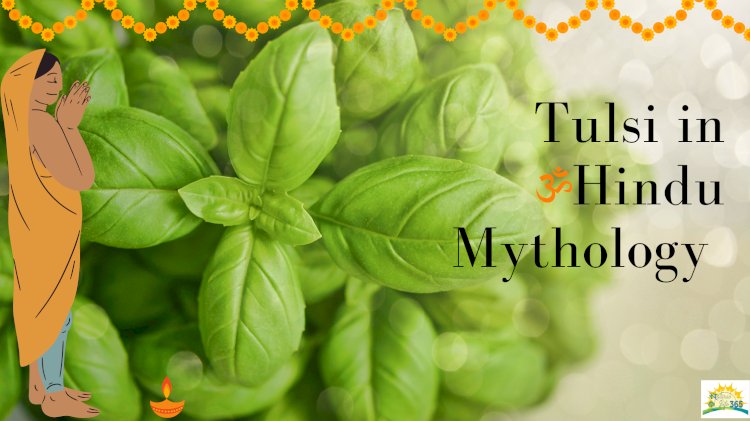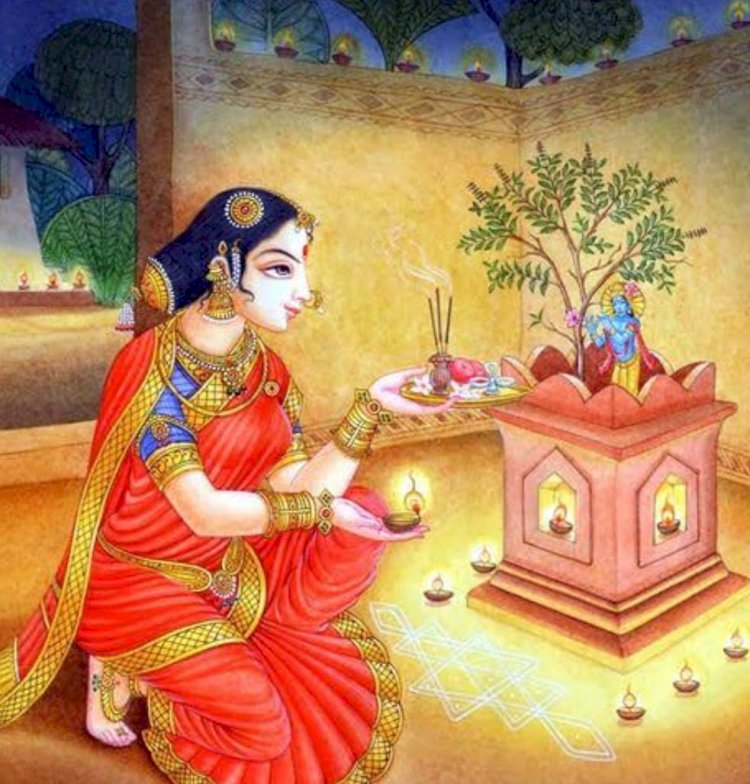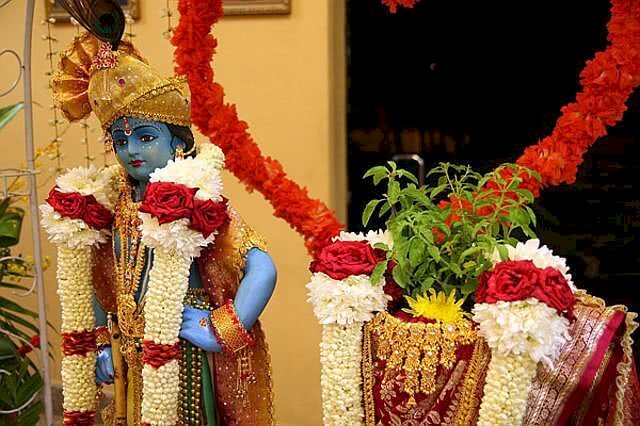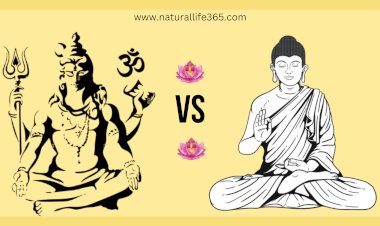The Divine Connection: Exploring the Role of Tulsi in Hindu Mythology and Rituals
This article delves into the significance of Tulsi, or Holy Basil, in Hindu culture and spirituality. From its role in Hindu mythology and rituals to its symbolic meanings and medicinal properties, this plant holds a divine connection that has been revered by Hindus for centuries.

Tulsi, also known as Holy Basil, is a plant that is highly revered in Hinduism. It is considered to be one of the most sacred plants in India, with a long history of use in Ayurvedic medicine and religious ceremonies. Tulsi has been celebrated for its medicinal properties and is known to possess numerous health benefits.
In Hindu mythology, Tulsi has a special significance as it is associated with Lord Vishnu and his avatar, Lord Krishna. According to legend, Tulsi was once a beautiful woman named Vrinda who was cursed by Lord Vishnu and turned into a plant. The plant that Vrinda became was then given the name Tulsi and has since been considered a symbol of purity, devotion, and divine grace.
Tulsi's association with Lord Vishnu has led to its use in various religious ceremonies and rituals in Hinduism. The plant is believed to have the power to ward off evil spirits and is used as an offering to the gods and goddesses. The leaves of Tulsi are also used in many Hindu households for everyday rituals and practices.
The purpose of this article is to explore the role of Tulsi in Hindu mythology and rituals. We will delve into the symbolic meanings of Tulsi and its significance in Hindu philosophy and spirituality. Additionally, we will examine the medicinal properties of Tulsi and how it is used in Ayurvedic medicine.
By the end of this article, you will have a greater understanding of the significance of Tulsi in Hinduism and how it is deeply ingrained in Indian culture and tradition.
You can also read Why India's New Ram Temple is So Important?
Tulsi in Hindu Mythology

Tulsi has a long and fascinating history in Hindu mythology. According to legend, Tulsi was once a beautiful woman named Vrinda who was married to the demon king Jalandhar. Vrinda was a devoted wife who had the power to make her husband invincible as long as she remained faithful to him. Lord Vishnu, in his avatar as Lord Krishna, sought to defeat Jalandhar and therefore approached Vrinda in the guise of her husband.
When Vrinda realized that she had been tricked, she cursed Lord Vishnu, and he, in turn, cursed her to turn into a plant. The plant that Vrinda became was then given the name Tulsi, and it has since been considered a symbol of purity, devotion, and divine grace.
The story of Vrinda and Tulsi is an important one in Hindu mythology and highlights the significance of fidelity and devotion. It is said that by using Tulsi leaves in religious ceremonies and rituals, one can attain the blessings of Lord Vishnu and Goddess Lakshmi. Tulsi is believed to have the power to ward off evil spirits and bring good luck and prosperity to those who use it.
In Hinduism, Tulsi is also associated with several other gods and goddesses. It is said that Lord Brahma resides in the roots of the Tulsi plant, Lord Shiva in the stem, and Lord Vishnu in the leaves. Goddess Lakshmi is also believed to be fond of Tulsi and is often depicted holding a garland of Tulsi leaves. The plant is considered to be a symbol of auspiciousness and is used in many Hindu households for everyday rituals and practices.
Overall, Tulsi's association with Hindu mythology is significant, and it has played an important role in shaping Indian culture and tradition. Its use in religious ceremonies and rituals has been a part of Hinduism for thousands of years, and it continues to be a symbol of purity, devotion, and divine grace to this day.
Tulsi in Hindu Rituals

Tulsi has been an integral part of Hindu rituals and ceremonies for centuries. It is considered to be a sacred plant and is used in various religious practices, including puja, havan, and other forms of worship. The use of Tulsi in Hindu rituals is believed to bring blessings and good fortune to the worshippers.
One of the most common ways in which Tulsi is used in Hindu rituals is by offering it to the gods and goddesses. The leaves of the Tulsi plant are believed to be a symbol of purity and devotion and are offered to Lord Vishnu and Goddess Lakshmi during puja. Tulsi leaves are also used in the worship of Lord Shiva, Lord Ganesha, and other deities in Hinduism.
In addition to offering Tulsi leaves to the gods and goddesses, the plant is also used in various other rituals. For instance, Tulsi is considered to be a purifying agent and is used to purify the water that is used in religious ceremonies. It is also believed to ward off evil spirits and is used to create a protective circle around the worshippers during puja.
Apart from its use in religious ceremonies, Tulsi is also an important part of everyday practices in Hindu households. Many Hindus keep Tulsi plants in their homes and offer prayers to them every day. It is believed that by doing so, they can receive the blessings of the gods and goddesses and bring prosperity and happiness to their homes.
So the use of Tulsi in Hindu rituals and ceremonies is an important part of Indian culture and tradition. Its significance can be traced back to ancient times and has remained a vital part of Hinduism to this day. The plant's association with purity, devotion, and divine grace has made it a symbol of auspiciousness, and it continues to be used in religious practices in Hindu households all over the world.
Medicinal Properties of Tulsi

In addition to its religious significance, Tulsi is also known for its numerous medicinal properties. The plant has been used for centuries in Ayurveda, the traditional Indian system of medicine, to treat a variety of ailments.
Tulsi is believed to have anti-inflammatory, analgesic, and antipyretic properties, which make it an effective treatment for a variety of conditions, including fever, cough, cold, and respiratory problems. It is also believed to have antioxidant properties, which can help protect the body from damage caused by free radicals.
One of the most significant health benefits of Tulsi is its ability to boost the immune system. The plant contains compounds such as eugenol, rosmarinic acid, and ursolic acid, which have been shown to stimulate the production of white blood cells and other immune cells. This makes Tulsi an effective treatment for a variety of immune-related disorders, including allergies, asthma, and autoimmune diseases.
Tulsi is also believed to have anti-cancer properties. Studies have shown that the plant contains compounds that can help prevent the growth and spread of cancer cells. Additionally, Tulsi is believed to have a protective effect on the heart and can help lower cholesterol and blood pressure levels, reducing the risk of heart disease.
Apart from its medicinal properties, Tulsi is also used in the beauty industry for its skin benefits. The plant contains compounds that can help improve skin texture, reduce acne, and protect the skin from damage caused by UV radiation.
In short, Tulsi's medicinal properties make it a valuable plant in Ayurvedic medicine and modern medicine. Its ability to boost the immune system, fight cancer, and protect the heart, among other benefits, has made it a popular herb in India and around the world.
Symbolic Meanings of Tulsi

Tulsi has several symbolic meanings in Hinduism, each of which highlights the plant's significance in Hindu culture and spirituality.
One of the most common symbolic meanings of Tulsi is purity. The plant is believed to have the power to purify the mind, body, and soul, and is often used in religious ceremonies to purify the surroundings and the participants. Tulsi is also considered to be a symbol of purity in relationships and is often given as a gift to newlyweds to bless their union.
Another symbolic meaning of Tulsi is devotion. The plant is considered to be a symbol of devotion and faith and is often used in prayer and meditation practices to enhance one's connection with the divine power to purify the mind and body and help one attain spiritual enlightenment. Many Hindus believe that by worshipping Tulsi, they can strengthen their faith and devotion to their chosen deity.
In addition to its spiritual significance, Tulsi is also believed to have a calming effect on the mind and body. Its fragrance is said to have a soothing effect on the nervous system, helping to reduce stress and anxiety. This is why many people in India use Tulsi leaves in their tea, which is believed to have a calming effect on the mind and body.
Tulsi is also believed to be a symbol of longevity and good health. The plant is known for its numerous medicinal properties and is believed to have the power to heal and protect the body from disease. Tulsi leaves are often used in traditional medicine to treat a variety of ailments and are believed to promote longevity and good health.
In addition to these symbolic meanings, Tulsi is also believed to be a symbol of prosperity, good fortune, and happiness. As mentioned before, the plant is often associated with the goddess of wealth and prosperity and is believed to bring good luck and fortune to those who keep it in their homes or offer prayers to it.
Mostly, the symbolic meanings of Tulsi highlight the plant's importance in Hindu culture and spirituality. Its association with purity, devotion, good health, and prosperity has made it a beloved plant among Hindus, and it continues to be an important part of Hindu rituals and ceremonies to this day.
Find this beautiful Tulsi plant pot for home here!
Tulsi, also known as Holy Basil, has been an integral part of Hindu culture and spirituality for centuries. Its medicinal properties and significance in Hindu mythology and rituals have made it a beloved plant among Hindus, and it continues to be an important part of their daily lives.
As we have explored in this article, Tulsi holds many symbolic meanings in Hinduism, each of which highlights the plant's importance in Hindu culture and spirituality. It is considered to be a symbol of purity, devotion, good health, and prosperity, and is believed to possess divine energy that can purify the mind, body, and soul.
Tulsi's importance is not just limited to its symbolic meanings, as it has several medicinal properties that have been backed by modern scientific research. It is known for its anti-inflammatory, anti-cancer, and anti-microbial properties, making it a powerful herb for treating a variety of ailments.
In conclusion, Tulsi is a remarkable plant that has been revered in Hindu culture for centuries. Its significance in Hindu mythology and spirituality, as well as its numerous medicinal properties, has made it a beloved plant among Hindus and a valuable herb in modern medicine. It is no wonder that Tulsi continues to be an important part of Hindu culture and spirituality, and its value will continue to be recognized by people around the world.
You can also read Why Does Hinduism Have So Many Gods?
References:
If you value these free online resources provided by Natural Life 365, please consider supporting my website by sharing the blogs ![]()
DISCLAIMER:
Some of the links in this content may be affiliate links. This means that if you click on one of the links and make a purchase, I may receive a commission (at no extra charge to you). However, I only recommend products that I personally use and have tested myself. Also, understand that I have taken reasonable steps to ensure that the information on this content is accurate, but I cannot represent that the website(s) mentioned in this post are free from errors. Please, check the Affiliate Disclosure at the bottom of this website.










































